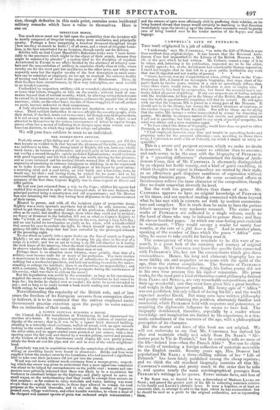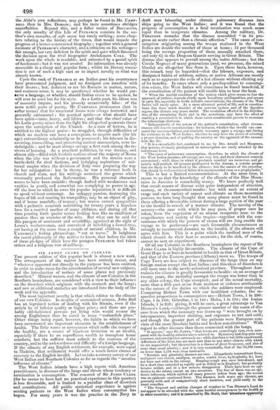CAMPBELL'S LIFE OF TETRARCH.
THIS work originated in a job of editing.
" I undertook," says Mr. CAMPBELL, " to write the Life of Petrarch more from accident than original design. It was known that the Reverend Arch- deacon Coxe had bequeathed to the Library of the British Museum a MS. life of the poet which he had written. Mr. Colburn caused a copy of it to be taken, and, intending it for publication, requested me to he the editor, I readily agreed ; for, as the Archdeacon had considerable literary reputation. I could not imagine that he had left to a great public institution any work
that was ill-digested and not worthy of perusal. • • •
" Great, however, was my disappointment when, sitting down to the Coxe- Petrarchan MS., I found it an incomplete biography, that stops short of the poet's death by twelve years, written in a style so sprawlingly diffuse, that, where three words would serve, the Archdeacon is sure to employ nine. I tried to remedy this fault by compression, but found the reverend man's ver- bosity defied all power of packing. If any one suspects me of dealing unfairly with the Archdeacon, let him go to the library of the British Museum and pe- ruse the work in question—his scepticism will find its reward. He will agree with me that the Coxcian MS. is placed in a wrong part of the Museum. It should not be in the library, but among the bottled abortions of anatomy, or the wooden visages of the South Sea idols. Nor will he blame me for saying that the entire MS. betrays a writer incapacitated by nature for dissecting on poetry. His ability to compose matter-of-fact travels and political memoirs I call not in question ; but with regard to any spark of poetical sympathy, his
mind was obtuse and a mere mortuum caput. • • • " To have edited this fetus of biography, would have done no good to either Petrarch, or Archdeacon Colo, or myself.
" I had employed, however, some time and trouble in consulting books and preparing notes for the proposed editorship ; and, unwilling to throw them away, I undertook to write a life of Petrarch, for which I should be solely re- sponsible."
This is a severe and pungent censure, which we make no doubt is deserved. But it is often easier to criticize than to execute; and such seems to be the case with the biography of TETRARCH. If a " sprawling diffuseness" characterized the diction of Arch- deacon CONE, that of Mr. CAMPBELL is alternately distinguished. by an elegant but feeble tenuity, and a kind of grave twaddling, in which thoughts not unjust in themselves are marred by their style, as an effeminate garb disguises manliness of expression without imparting feminine grace. Neither do some occasional efforts at facetiousness relieve the tame character of the composition, though they no doubt somewhat diversify its level. - But the work has greater defects than those of style. Mr. CAMPBELL appears to have no original knowledge of TETRARCH or his times, and not much of reading connected with them beyond what he has met with in extracts set forth by modern commenta- tors and compilers. Nor in truth does he seem to have the patiens laboris necessary for very moderate research. The entire prose works of TETRARCH are collected in a single volume, ready to the hand of those who may be induced to peruse them ; and they fill eleven hundred pages. At which our ease-loving poet exclaims in wonderment, "'They would occupy a reader for nearly four months, at the rate of a full hour a day." And in another place, speaking of the number of lines which the poem " Africa" con- tains, he seems to take credit for having read it.
The consequence of what we conclude to be this want of re- search, is a great lack of the certainty and mastery of original knowledge. Mr. CAMPBELL may know the specific facts connected with TETRARCH'S life, but not the concomitants which give them rraisemblance. Hence, his long and elaborate biography has no more lifelike air, and acquaints us no more with the spirit of the age, than the curtest compilation. The Sonnets of TETRARCH survive to speak for themselves ; though his Italian poetry did not in his own time procure him his highest reputation. His prose works, for the most part a kind of rhetorico-moral philosophy derived front PLATO and SENECA, are very remarkable compositions, and for their age wonderful ; and they must have given him a great intellec- tual weight in that ignorant period. His heavy epic of " Africa" was not published, but only talked of during his life ; and the world expected another Eneid. But many men have written philosophy and poetry without attaining the position, alternately familiar and monitorial, which TETRARCH held with emperors and potentates, or acquiring the diplomatic influence he seems to have had. The biography desiderated, therefore, especially by a reader whose knowledge and imagination are limited by his experience, is a dra- matic embodiment of the manners of the age, with a philosophical perception of its character.
But the matter and form of this book are not original. We will not undertake to say that Mr. CAMPBELL has derived his plan and materials wholly and solely from DE SADR'S " Me- moires pour la Vie de Petrarch," but he certainly tells no more of the life—indeed less—than the French Abbe.* Nor can he claim the credit of rendering a foreign collection of materials accessible to the English reader. Seventy years ago, Mrs. DOBSON had popularized DE SADE; a three-shilling edition of her " Life of Petrarch " has been lately published among the cheap reprints ; and we think the old standard biography contains all that Mr. CAMPBELL'S contains, and pretty much in the order that he tells it, and quotes nearly the same autobiographical passages from PETRARCH'S writings as he quotes. Fewer minute facts, and less of • DE SADE was, or fancied he was, a descendant of Madame LAURA DE SALE ; and passed the greater part of his life in collecting materials relative to his family and LAURA'S platonic lover. It were a hopeless, or at least an uncertain task, to attempt to add to the facts which he has accumulated: but he should be used as a guide to the original authorities, not as superseding them.
the Abbe's own reflections, may perhaps be found in Mr. CAMP.. I3ELL than in Mrs. Donsort ; and his taste sometimes abridges superfluities. Beyond this, and a fuller notice of Boccaccio,
the only novelty of this Life of PETRARCH consists in the au- thor's own remarks, of safe sense but rarely striking ; some chap-
ters relating to the history of the times, that would impede the
progress of a better-constructed biography ; together with a general estimate of PETRARCH'S character, and a criticism on his writings— fair enough, but very deficient in the spirit and spice which flavoured
the decision upon the rival biographer Archdeacon COX.E. The
work upon the whole is readable, and animated by a genial spirit of bonhommie ; but it was not wanted. Its information was already accessible in a cheap and popular form ; whilst its literary execu- tion is not of such a high cast as to impart novelty to what was
already known.
Upon the rank of PETRARCH as an Italian poet his countrymen have pronounced judgment, and no foreigner can interfere with
their decree ; but, deficient as are his Sonnets in matter, nature, and common sense, it may be questioned whether he would pre- serve a language, or whether, should Italian cease to be spoken, he will ever be used but for his style. As a Latin poet, his idiom was of necessity impure, and his prosody occasionally false : of the more noble parts of poetry, Mr. CAMPBELL pronounces (but in softer terms) that his structural forms were always borrowed and generally caricatured ; his poetical spirit—or what should have been spirit—tame, heavy, and lifeless ; and that the chief value of his Latin poetry arises from the light his allegorical pastorals throw upon the corruption of the Church. As a man of letters, he is entitled to the highest praise : he struggled, through difficulties of which no modern can have a conception, to acquire such (for his age) extraordinary scholarship as he possessed ; his labours in dis- covering, transcribing, and preserving ancient manuscripts, were in- defatigable ; and he must always occupy a first rank among the re- vivers of learning. As a practical politician, he was dreamy, and almost silly—filled with bookish notions about the majesty of Rome when the city was without a government and the streets were a battle-field for rival factions, and indulging aspirations of uni- versal empire when the divisions of Italy were preparing the way for her subjugation : but in theory, he was a reformer both in church and state, and his writings contained the germs which eventually produced the Reformation. His personal character seems to have been amiable ; though dashed with weaknesses and vanities in youth, and somewhat too complying to power in age. Of the love to which he owes his popular reputation it is difficult to speak without contempt. An unhappy passion, destroying the hopes of life and marring its tranquillity, may be an object of pity, and if borne manfully, of respect ; but reason cannot sympathize with a pedantic coxcomb nourishing for twenty years a hopeless love for a married mother of many children, and during all that time pouring forth quaint verses looking less like an ebullition of passion than an exercise of the wits. But what can be said for this paragon of sentiment and sensibility, agonized at the sight of Laura's washerwoman, and convulsed at beholding a laurel-tree, yet having at the same time a couple of natural children, in Mr. CAMPBELL'S feeling phraseology, " out at nurse." It heightens the moral philosophy of the matter to know, that before the birth of these pledges of illicit love the paragon PETRARCH had taken orders and a religious vow of celibacy.



























 Previous page
Previous page